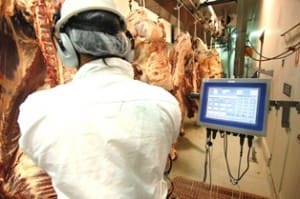A BIG drop in US fed cattle prices over the past month has opened up a gap worth up to $300 a head in comparisons with similar grainfed export cattle out of Australia.
The move has added considerable competition headwinds for Australia in key grainfed export markets like Japan and South Korea, trade sources say.
 Export grainfed cattle are currently worth around 600-610c/kg in southern Queensland processor forward contract grids this week.
Export grainfed cattle are currently worth around 600-610c/kg in southern Queensland processor forward contract grids this week.
Contrast this with US fed steer cattle futures, which for December are at US$104/cwt, which equates to 533c/kg Australian dollars equivalent dressed weight. Apply that 70c/kg price difference over a typical 350kg 100-day grainfed ox, and the Australian example is $245/head worse off.
Comparisons with October US cattle futures prices quoted on Friday are even worse, at US$99/cwt (510c/kg Australian equivalent), making Australian fed cattle prices at today’s market $315 a head worse off than equivalent US export beef in comparisons.
The US Futures market has deteriorated quickly since last month’s fire at Tyson Foods enormous Holcomb beef processing plant in Kansas, which harvests up to 6000 cattle per day, making it the second largest in the US. Commentator Steve Kay covers off on the market impact in this earlier monthly report.
While US fed cattle prices have headed south, the US cut-out has gone through the roof, with processor profits currently estimated at up to $400/head.
“The first thing US processors will do is start to sell meat into international markets cheaper, before they start paying more for the cattle,” one market analyst told Beef Central this week.
“It hasn’t really happened yet, because the cattle price market shift is still working through the system, but once the US starts to drop grainfed beef prices into Japan and Korea, Australia is going to have to compete against that, or miss out – given that they currently have a $300/head head-start,” he said.
Some Australian processors’ grainfed forward contract price offers have already responded to the developments, in one case dropping 10c/kg this week to 590c/kg for 100-day grainfed, HGP implanted.
Other forward contract grids have not yet shifted off earlier offers, around 600-610c/kg.
Closer alignment
In commentary several months ago, MLA noted the closer alignment that has occurred this year between Australian and US cattle prices.
While Australian processors continue to run at elevated levels due to drought turnoff, the limited supply of slaughter-ready cattle, particularly grassfed, and strong demand in key export markets has kept the pressure on finished cattle prices.
Australian cattle prices typically track between those in North and South America, but recent movements have pushed the Australia market closer towards the US. Recently the Australian heavy steer indicator had closed in on the US Choice fed steer since the opening of the year and was tracking at a narrow 14pc discount. This is in comparison to a pre-drought (2010-2012) 25pc discount to US fed steer and a whopping 57pc discount on November 2014.
In contrast, the Australian cattle market has pulled away from that of Argentina and Brazil, the two South American heavyweights whose cattle have become very cheap by global comparisons due to significant currency depreciation. New Zealand has largely kept pace over the last two years and Uruguay has broken away from its South American neighbours to trade near parity with Australia, due to acute supply shortages.
“The US remains Australia’s most significant global beef competitor. It is the world’s largest producer and has the greatest overlap in high value markets with Australia – and the relative increase in Australian cattle prices reflects the strong competition in international markets, particularly Japan and Korea,” MLA said.
“While the US herd may soon enter contraction, beef supplies are not expected to recede in the next year. Moreover, when Australia has a solid drink and the herd enters a rebuild phase, the cattle market may come under significant upward pressure and approach, or even surpass, the US, as witnessed briefly in 2016.”
Insatiable appetite
Meanwhile, Argentina and Brazil will continue pumping large volumes of cheap beef onto global markets. South American suppliers primary overlap with Australia in China but, fortunately, the market has demonstrated an insatiable appetite for beef imports over the last two years. However, if trade with the world’s largest imported beef market was to slow down, cheap product out of South America could be diverted into other markets where Australia operates, such as South East Asia, MLA suggested.
“While current finished cattle prices are a blessing for Australian producers with stock to sell – and could move higher with a seasonal break – the decoupling from historical price spreads creates challenges with remaining cost-competitive,” MLA said.
“This is especially pertinent when considering the relatively high cost of doing business in Australia and the fact that Aussie beef customers are increasingly found in overseas markets.”
Grassfed grid prices steady to softer
In grassfed markets this week, weather conditions continue to drive cattle to market in large quantities, with processors in Queensland and NSW spoken to for this report saying they are still comfortably-off for supply during mid-September.
Grid prices in the key southern Queensland region remain unchanged this week, at 550-560c/kg on four-tooth ox (some plants 10c/kg less on HGP-treated, and 450-460c/kg on heavy cows. Central Queensland rates are 10c/kg behind that, and North Queensland 10c lower again.
NSW over the hooks prices last week declined another 4-5c/kg on average, with grown steers +300kg easing to 533c/kg, and heavy cows +280kg at 463c. In Victoria, grown four-tooth grassfed steers were unchanged last week at 567c/kg, while heavy cows +280kg were a shade easier at 473c.
